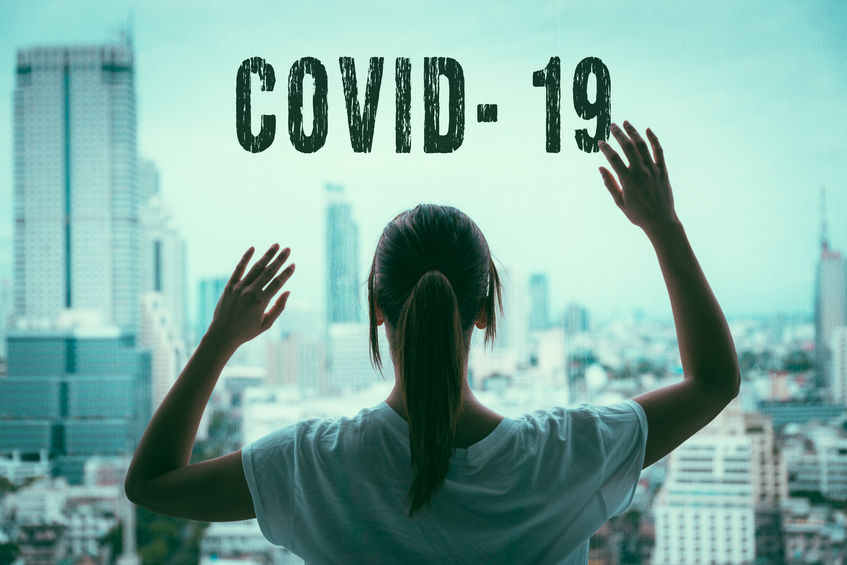|
The harmful effects of COVID-19 may go beyond the body, whether you’ve contracted the disease or not, according to University of Arizona research looking at the impact of the novel coronavirus on mental health. A team of UArizona psychiatrists and sleep researchers led by William “Scott” Killgore, psychiatry professor in the College of Medicine – Tucson, found evidence in surveys that during the wide lockdown period in April, there may have been a spike in suicidal thoughts in the United States. They found two possible reasons for the increase: loneliness and anxiety-induced insomnia. Their findings, which are yet to be peer-reviewed, were recently published as letters to the editor of the journal Psychiatry Research. The findings are based on surveys of over 1,000 Americans between the ages of 18 and 34. The team continues to analyze survey data monthly in an effort to track mental health responses to COVID-19 throughout the year. UANews spoke with Killgore and sleep expert and study co-author Michael Grandner, an associate professor of psychiatry and director of the Sleep and Health Research Program in the Department of Psychiatry and the Behavioral Sleep Medicine Clinic at Banner – University Medical Center Tucson, on ways to protect mental health during this time Q: How pervasive is the feeling of loneliness in isolation? Killgore: We found that during the lockdown period back in April, right when COVID cases were modeled to peak, that the rates of loneliness were quite high. According to our survey results, 93% of respondents were sheltering in place; 61.5% felt social isolated much of the time and 43% exceeded the cutoff for high loneliness, which is higher than previous reports. It’s not common to have this level of isolation on such a wide scale. Q: What are the public health consequences of such wide-spread loneliness? Killgore: We found that reported loneliness was strongly correlated with depression. Of the people who scored in the lonely rage (the 61.5% of respondents), 54.7% of lonely participants met clinically significant criteria for moderate to severe depression. Only 15% of non-lonely participants felt that way. Then we focused in on the survey question that asked how often you’ve had thoughts that you would be better off dead, or hurting yourself in some way. We divided respondents into those who said no and those who said yes at any point in the previous two weeks. We found that 35% of the people who scored in lonely range had thoughts of suicide or self-harm. Pre-pandemic, the rate of suicide ideation is much lower, typically between 2 to 4%. Q: Do you have any tips for beating loneliness? Killgore: We might all be “Zoomed out,” but try to think creatively about ways to stay socially connected. Getting outside is also important. Even if you stay a safe distance from people, you can see that the world is better and you’re not alone. Research has even shown that people who get more sunshine have much better mental health outcomes. Sunlight, especially in the morning hours, can help with mood and reduce depression. We find that people who get outside for 10 minutes of sunshine or more regularly seem to have a better ability to cope with the stresses of the pandemic. Fresh air and physical activity can be helpful for mood too. Q: What have you learned about the role of insomnia in mental health during this stressful time? Killgore: Although most people don’t have suicidal thoughts, we found that, as you might expect, the more afraid you are of COVID-19, the more likely you are to have occasional thoughts about suicide or self-harm. But we were interested in the role of sleep and insomnia in this relationship. Our statistical analysis revealed that it’s the insomnia triggered by the fear of the virus that’s causing suicidal ideation. If you’re afraid of COVID, you’re more anxious, and that’s affecting your sleep, which is critical for processing this fear. Without sufficient good quality sleep, suicidal thoughts start to have a louder voice. Q: How might COVID-19 fears affect people differently? Killgore: People with existing mental health issues are going to be more susceptible. But even for people who may not have a history of mental health problems, if you’re not sleeping well, you can be affected too. Sleep is important for your brain to think rationally, and if you don’t get sufficient good sleep then it becomes harder to distinguish rational from irrational thoughts – at 3 a.m., emotional thoughts tend to have greater sway, and you make different decisions than you might during the sobriety of daylight. In fact, your brain starts to think differently when you haven’t had good amount of sleep. We’ve done research that shows that when we’re sleep deprived, we make many of the same types of errors as people with lesions in their ventromedial prefrontal cortex – the area of the brain responsible for emotion, decision-making and social cognition. Q: What are some tips for getting better sleep? Killgore: Again, getting outside helps. Blue morning light helps reset your wake/sleep cycle and helps you get sleepy at a more reasonable time. Grandner: Falling asleep can be difficult when you have a hard time detaching and disconnecting from your thoughts at the end of the day, especially when you’re glued to the news. To combat this, give yourself time to wind down before bedtime. Take time to relax and switch gears by avoiding screens. Instead, try reading or relaxing each of your muscles one at a time. Waking up and being unable to fall back asleep is also becoming more common as people become more stressed. While it’s normal to awaken up to 30 times nightly, it’s only for a few seconds and you don’t remember it. It becomes an issue when you’re awake for 20, 30 minutes or more and when these awakenings are driven by anxious thoughts. You can overcome this by realizing that your anxious thoughts at 3 a.m. are unproductive. It’s also good to get out of bed as soon as you know you’re not falling back asleep. You want to preserve your bed as a place for sleep to train your brain into associating it that way. When you stay tossing and turning in your bed, you’re training your brain to respond that way in the future. Try to find a few ways to relax yourself like you do before bedtime. Working from home or stress can make sleep patterns irregular, but your body likes routine. Throwing your body’s biological clock off can impact all sorts of natural rhythms such as appetite, metabolism, even hormones, which can cause people to feel drained and sluggish even without exerting themselves. It’s important to build regularity into your day. Go to bed and wake up at a similar time every day. When you wake up in the morning, get some sunlight and move around. |




